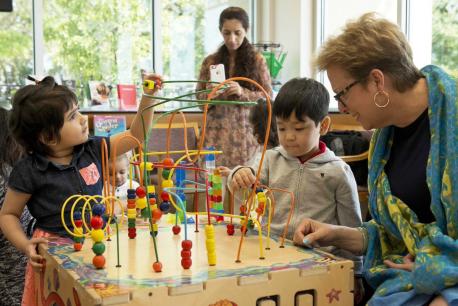
How to Help Children Heal After Tragedy Strikes
Using lessons learned in the field, UNICEF USA President and CEO Caryl M. Stern offers advice for adults who want to comfort and protect the kids they love.
Yet another mass shooting. There's so much to process. Families across the country are on edge. How do we help our children cope with the unprecedented level of violence in America’s schools and public spaces? How do we help our children feel safe?
For the past decade, as President and CEO of UNICEF USA, I’ve been dedicated to advancing UNICEF’s mission to help children around the world. One of the crucial parts of our work is counseling and providing emotional support to children who, through no fault of their own, are growing up in war zones amidst humanitarian and natural disasters. With a long history of working with children through education and anti-bias training before coming to UNICEF USA, these conversations are very personal to me.
Children and young people respond differently to trauma than adults. Some may react immediately; others may withdraw and only show signs of difficulty later. Their needs will vary depending on their ages. Here is a guide for how to talk with and help your child after a disaster or traumatic event:
Focus on the child, not the trauma
Be present for your children. Listen carefully to their concerns. If your children are small, get down on their level. Speak in a calm voice, using words they understand. Young children may act out events they cannot comprehend. Teens may shrug off disturbing news and respond with a routine “I’m fine.” At all ages, children look to the adults in their lives for guidance, so take a deep breath, meet them where they are emotionally and let them know that your love for them is unwavering.
Be careful not to pressure children
Some children will be eager to discuss what happened. Others may find it too disturbing to contemplate the specifics of an event. Children who are reluctant to talk about their feelings may find it easier to write or make art to help them process recent events. Don’t force it; follow their lead.
Offer reassurance
Tell your children that you love them and remind them that the adults in their life are doing everything they can to keep them safe. Give them lots of hugs. Plan to spend extra time with them as they get past the trauma. Children are resilient and hopeful. Give them time.
Help children get back to their normal routine
It is especially important for children affected by trauma to get back to playing and learning so they can regain a sense of routine and normalcy. In crisis spots around the world, UNICEF sets up Child-Friendly Spaces where children can get back to being children. Spending time with friends or having a quiet place to read or draw can help children regain their equilibrium.
Show them how they can help
Talking to children and showing how they can help others can be a vital step to restoring confidence. Consider what small actions you or they can take locally — together you can write letters to elected officials, or make posters or hold fundraisers for a trusted organization, or attend a rally or support a local program.
These conversations aren’t easy, but can be crucial to ensuring that children feel safe after terrifying events. This generation of children is growing up in a violent world not of their own making. The senseless attacks here in the U.S. connect American children with others just like themselves facing violence around the globe. All children everywhere deserve to grow up in a world free of violence, where they can reach their full potential. It is time for decision makers to come together to protect children and address violence, in all its forms – and to create a world fit for our children.
HOW TO HELP
There are many ways to make a difference
War, famine, poverty, natural disasters — threats to the world's children keep coming. But UNICEF won't stop working to keep children healthy and safe.
UNICEF works in over 190 countries and territories — more places than any other children's organization. UNICEF has the world's largest humanitarian warehouse and, when disaster strikes, can get supplies almost anywhere within 72 hours. Constantly innovating, always advocating for a better world for children, UNICEF works to ensure that every child can grow up healthy, educated, protected and respected.
Would you like to help give all children the opportunity to reach their full potential? There are many ways to get involved.



